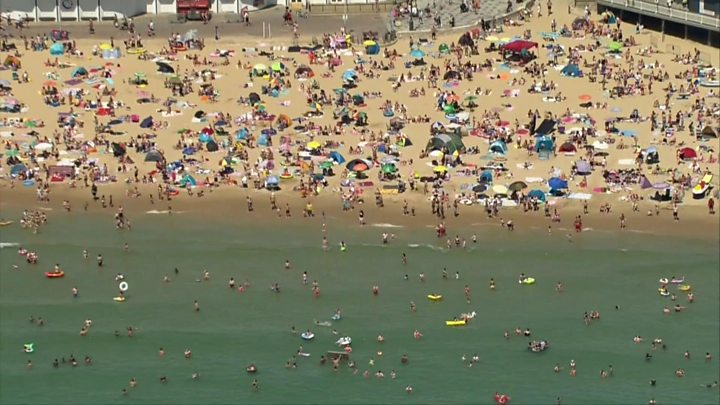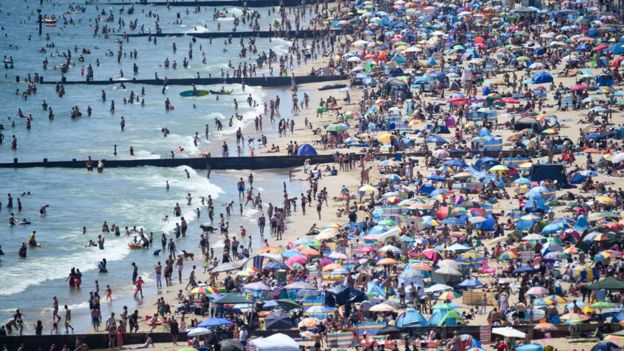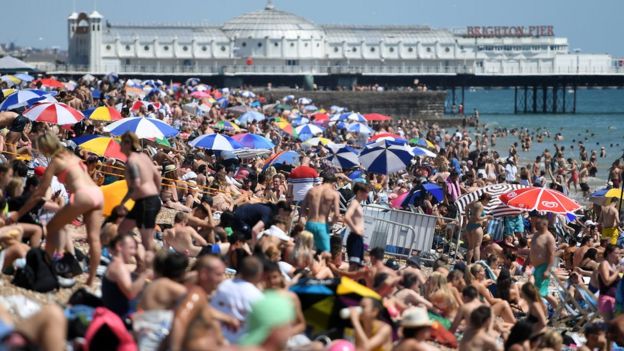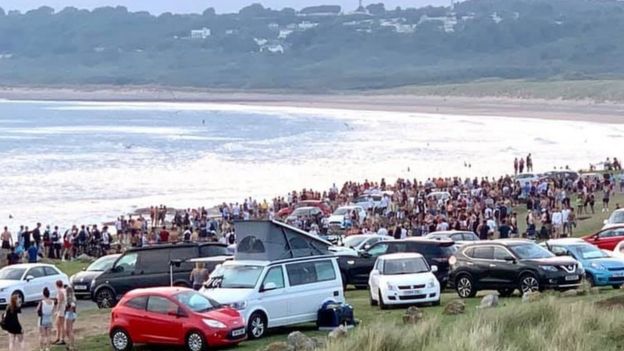
Beaches will only be closed by the government "reluctantly", Environment Secretary George Eustice has said - after a major incident was declared as thousands crowded into Bournemouth.
Mr Eustice said people needed to work with the government and observe coronavirus guidelines.
Health Secretary Matt Hancock has suggested beaches could be closed by the government if infections rise.
It came after England's chief medical officer said distancing remained vital.
Prof Chris Whitty warned Covid-19 cases "will rise again" if rules are ignored.
Mr Eustice told BBC Radio 4's Today programme Mr Hancock had "made clear we do have the powers to go back in and act".
He added: "We don't want to do that and we will be very reluctant to do so".
"We are appealing to everyone who does decide to go to the beach to observe that social distancing and stay within their family," he said.
He told BBC Breakfast that people have "generally" observed current social distancing rules - keeping 2m apart from other households.
 GETTY IMAGES
GETTY IMAGES
Asked specifically about scenes on the south coast of England, he said: "We just have to recognise yesterday was the hottest day of the year, incredibly hot, a lot of people had the same idea, they all went to the beach, and yes of course those scenes at Bournemouth are a matter for concern.
"The British weather being what it is maybe that will be short-lived and people will return to the type of social distancing they've actually demonstrated quite well."
- What are social distancing rules?
- This is what local lockdowns could look like
- When can I go on holiday in the UK?
Bournemouth, Christchurch and Poole Council said Bournemouth beach was "stretched to the absolute hilt" on Thursday, while Dorset Police said there were reports of gridlocked roads, fights and overnight camping.
Sam Crowe, the director of public health at Dorset Council, told the BBC the major incident was a standby measure declared due to an increase in visits to local accident and emergency departments.
He said there were also reports that heavy traffic was making it difficult for ambulances to respond to calls.

Now it's up to the public

The concern about people flocking to beaches comes at an important point in our fight against the virus. The UK has been seeing infections fall despite the easing of restrictions.
Six weeks ago when the prime minister announced the first steps out of lockdown the number of newly diagnosed infections was around 4,000 a day. Those numbers have fallen by three-quarters since - with 1,073 a day being recorded, on average, over the past week .
But a combination of warm weather and the further easing of restrictions on 4 July means we are at a crucial juncture.
Much is being left to the good judgement, common sense and personal responsibility of people.
Government experts believe with the testing and tracing system in place the virus can continue be suppressed - but only if the public plays its part.

Mr Crowe added he was perhaps more concerned about people's contacts in enclosed environments, such as the trains on which visitors spent long periods travelling to the region.
"We are still in a pandemic, please think twice, think carefully," he said.
Jane Martin, a palliative care nurse from Wimbourne, Dorset, told the BBC the number of cars on the road in Bournemouth this week made it difficult for her to visit patients.
"I was gridlocked on Wednesday trying to reach patients," she said. "It took me six-and-a-half hours to only get to three clients who are vulnerable."

- SCHOOLS: When will children be returning?
- EXERCISE: What are the guidelines on getting out?
- THE R NUMBER: What it means and why it matters
- AIR TRAVELLERS: The new quarantine rules
- LOOK-UP TOOL: How many cases in your area?

BBC News At Ten interviewed some of the many beachgoers as part of its report on Thursday's scenes in Bournemouth. One man told the TV cameras: "It's probably going to cause a second wave. People are just doing what they want."
Another woman said: "Social distancing has gone out the window and obviously I think we are part of that because we are here from Hertfordshire today. It's packed."
Tobias Ellwood, the Tory MP for Bournemouth East, said the beach should have been closed down.
"We need to learn from this and recognise that if we're going to be serious about tackling this pandemic then we need to be swifter in being able to provide support to local authorities that are unable to cope," he told the BBC.
 EPA
EPA
Council leader Vikki Slade said there have been problems in Bournemouth since lockdown first eased in May.
She said the fact that pubs, bars and restaurants are still closed pushed people towards the town's beaches and pier.
On Thursday, for the second consecutive day, the UK recorded its hottest temperature of the year so far, with highs of 33.3C (92F) at Heathrow Airport.
Bournemouth saw a high of 30C (86F) with Brighton, which also saw busy scenes, peaking at 29C (84.2F).
Two men were stabbed after a large group of people gathered on Leysdown beach in Kent.
In Wales, which also saw its hottest day along with Scotland on Thursday, First Minister Mark Drakeford warned lockdown restrictions will not be eased if parties and fights at beaches continue.
Violent clashes were seen at the beach in Ogmore-by-Sea in the Vale of Glamorgan on Thursday.

Temperatures around the UK are expected to be considerably lower, with thunderstorms forecast for many parts, for Friday.
The UK's coronavirus death toll is now 43,320, including a further 149 announced on Thursday.
The latest figures, released by the Department for Health and Social Care, showed a further 1,118 people tested positive for the virus - the first increase in six days.

No comments:
Post a Comment